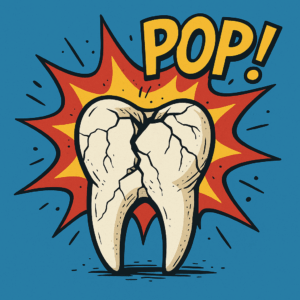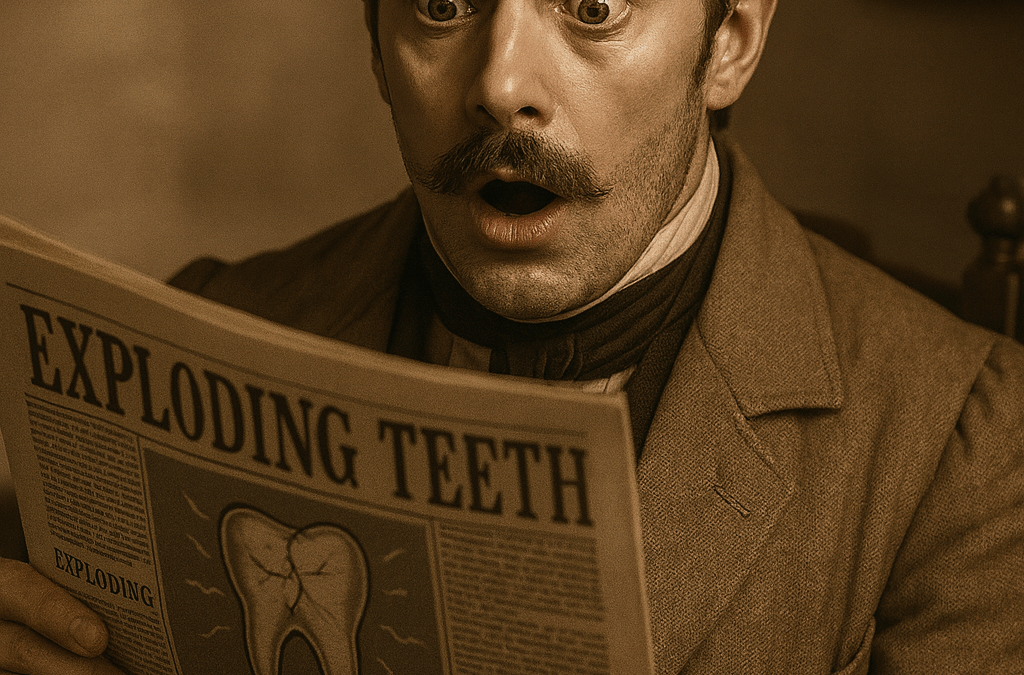
Where Did the Stories of Exploding Teeth Come From?
The most famous case occurred in 1817, when a priest in Pennsylvania reportedly suffered excruciating dental pain that ended in the sudden shattering of his tooth. Around the same time, British dental journals described similar events. The stories spread widely, with some dentists speculating about trapped gas inside the pulp chamber or unusual environmental pressures. For patients and readers of the time, the idea of “exploding teeth” was both horrifying and fascinating.
To put it in context: this was a period before reliable anesthesia, antibiotics, or even a true understanding of bacteria. Toothaches were mysterious and often unbearable. So when a tooth fractured suddenly under pressure, it wasn’t surprising that the event was described in dramatic terms. After all, to a person living in 1817, what else could you call it but an explosion?
Possible Explanations for Exploding Teeth
Although no modern dentist has seen a tooth explode spontaneously, several theories might explain the phenomenon:
- Infection and Gas Buildup: Severe decay can lead to bacterial activity that produces gas. If the pulp chamber is sealed off, pressure could theoretically build up and cause a sudden fracture.
- Temperature Extremes: In the 1800s, fillings were often made from metals like tin and lead, which expand and contract with heat. Drinking a very hot drink right after something cold could have caused a violent crack, which people might have described as an “explosion.”
- Abscess Rupture: Dental abscesses can fill with pus under pressure. A sudden rupture might feel and sound explosive, especially without modern understanding of infections.
- Exaggeration: It’s also possible that frightened patients or eager reporters exaggerated severe fractures into tales of exploding teeth.
What’s important to remember is that many medical “facts” of the 1800s were clouded by superstition, poor recordkeeping, and lack of scientific tools. The exploding teeth stories probably sit somewhere between fact and folklore.
Lasers and the Modern “Exploding Tooth” Myth
Even in the 20th century, dentistry wasn’t immune to this strange imagery. Early experiments with dental lasers sometimes caused problems before water cooling was perfected. Without proper cooling, the tooth pulp could overheat dramatically. In some cases, this led to enamel cracking or spalling that looked sudden and violent—enough for some to describe it as a miniature “explosion.”
Researchers discovered that pulpal temperatures rising more than about 5–6°C could cause permanent damage. This pushed the development of air and water cooling systems, which today make lasers safe for everyday dental use. Still, the image of teeth “bursting” under the stress of early technology reinforced the legend of teeth that can suddenly explode.
Could Teeth Really Explode?
Strictly speaking, no. Teeth don’t contain combustible materials and cannot truly detonate. However, infections, fractures, abscesses, and thermal stress can cause sudden, painful cracks or ruptures that might feel explosive to someone experiencing them. When combined with 19th-century superstition and 20th-century technology stories, it’s no wonder this legend has stuck around.
Even today, patients sometimes describe dental pain in dramatic terms: “It felt like my tooth was going to explode.” That phrase may be metaphorical, but it shows how powerful and alarming oral pain can be.
A Weird Dental Fact With a Lesson
As entertaining as the myth of exploding teeth may be, it serves as a reminder that ignoring dental pain is never a good idea. Severe untreated infections can cause bone loss, systemic illness, and emergencies that no one would want to experience. Thanks to modern dentistry, you won’t ever face a true “tooth explosion”—but you should always take tooth pain seriously.
And next time you hear the phrase “exploding teeth,” you’ll know the truth: what started as 19th-century folklore and 20th-century laser mishaps is really a story about how fragile—and fascinating—our teeth can be. You can even read about these historical reports in an article from the BBC.
Want more strange stories like this? Explore our Weird Dental Facts collection or check out our guide on natural digestive enzyme supplements to keep your teeth and gut in balance.




